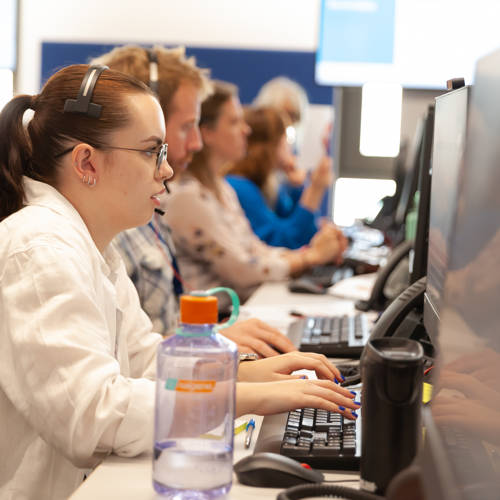Overview
Get ready with a foundation year and learn the foundational skills and knowledge to complete a full Honours degree. You'll be able to embark on this qualification without meeting the level 3 entry requirements, giving you the opportunity to study at degree level through this four year course.
Build your future through code with our Software Engineering degree. Designed for problem solvers who want to create innovative, secure, and high-quality digital systems, this degree will prepare you for industries including medicine, education, and space flight.
This BEng (Hons) Software Engineering course blends practical coding experience with industry-standard tools, real-world projects, and expert teaching. If you're passionate about app development, cybersecurity, or AI, this degree will give you the skills and confidence to succeed in this fast-paced, in-demand sector.
Taught in a supportive, inclusive environment, you’ll learn to design, build, test and deploy software that solves real-world problems, setting you up for a career in software development, web development, cybersecurity, and beyond.
What you’ll learn
- Discover how future tech is shaping our world and explore the big questions about its impact on people, business, and education.
- Create apps that solve real problems, using the Conceive – Develop – Implement – Operate (DIO) engineering model created by Massachusetts Institute of Technology.
- Explore how Artificial Intelligence is changing the world and how human psychology impacts user experience (UX) and design.
- Collaborate on group projects with real clients to develop teamwork and communication skills.
- Graduate with career-ready technical skills and a strong portfolio that showcases your potential to employers.
Whether you want to become a software engineer, ethical hacker, or AI specialist, this course is your launchpad into your chosen sector.
Why study Software Engineering at CCCU?
- Select your qualification
- Select your grade
- Add it and repeat
Accepted qualifications
We accept a wide range of general qualifications that attract UCAS Tariff points either on their own or in combination with others. Below are some common examples.
| Qualification | Grades |
|---|---|
| A Levels | DDE |
| BTEC | MPP |
| Access | Pass 45 Credits |
| International Baccalaureate | TBC |
Please note: You will also need GCSE Maths and English Grade C/4 or above to study this course.
More information
Contact us
Module information
Core/optional modules
How you’ll learn
As a Computing academic team, we are dedicated to supporting your development as skilled, analytical thinkers who are ethically aware of the impact of technology on the world and its future.
To help you achieve this, we use a range of teaching methods tailored to your learning needs. Your learning experience will include lectures, tutorials, and online resources delivered through our Virtual Learning Environment (VLE), alongside hands-on workshops and interactive exercises. This approach ensures a dynamic and engaging learning experience, with regular one-to-one feedback and support.
By the end of this journey, you will have developed the independence, confidence, and problem-solving skills necessary to succeed at Level 4 and beyond.
This course uses a Conceive-Design-Implement-Operate-like structure – where some of your teaching will be done via real-world inspired projects. You will be taught through a combination of lectures, seminars and practical labs.
You will typically have around 12 contact hours per week and are expected to also spend about four hours each week co-ordinating with team members on group activities.
Labs will often emphasise working in small groups to enable you to discuss and develop your understanding of topics covered in lectures and place theory into practice.
You will also have regular scheduled meetings, in addition to the above contact hours, with an assigned academic personal tutor, which is your first point of contact for assistance to your undergraduate needs. Your actual contact hours depend on the option modules you select.
Building upon the resources and learning that has taken place in the taught module sessions with experts, independent study enables you train to teach yourselves to become autonomous, self-led learners over the period of your course, from enrolment through to graduation.
We provide you with resources for you to use as a basis of your independent research, which could include the use of web-based resources, journal articles, recordings of events that relate to your studies, access to development software, library sources of information, online academic skills workshops, etc.
We also provide you with the opportunity to attend maths and statistics support sessions if you feel that you’d benefit from additional one-to-one and small group sessions.
Your overall workload typically consists of 12 contact hours and an additional 25 hours of independent learning per week. In addition, there may be field trips and other events as a part of your course of study.
You will undertake a mix of 15 credit and 30 credit modules. Your study time in class will about 12 hours a week plus work on assessments. Assessments would normally be expected to take approximately 75 hours for each 30-credit module assignment. There are no formal examinations although there are some time-constrained assessments in which you will be expected to carry out a particular task or set of tasks within a given time.
You will be taught by a mix of experienced professionals from industry as well as academics who are experts in the fields of research, which includes attendance to conventions and conferences that inform the teaching undertaken within the course. Seminars and Lab sessions can also be facilitated by current and active PhD researchers with a focus on their areas of specialism.
Academic staff are actively researching current and emerging issues and dynamically developing links with industry to ensure that the material that we are teaching you is relevant to employers which will provide you with opportunities to improve your prospects for employment.
Some of the specialisms and expertise that inform our teaching and learning experiences for you, include: XR (AR, MR, VR) and Immersive Technologies, Artificial Intelligence, Machine Learning, Databases, Knowledge-based systems, and Software Development Systems using CDIO Processes.
We will work with you to develop the technical and people skills you will need to work successfully within the software industry.Tim JacksonCourse Director
How you’ll be assessed
We want to make sure that your experience is authentic and represents how you are likely to work in industry when you graduate. This means our assessments have been created in partnership with local organisations and typically consist of a mix of individual and group coursework, written reports, presentations and practical development labs.
Each year, your studies include a mix of specialist modules with interdisciplinary modules to provide you with the ability to work alongside students from across the university.The majority of assessments are problem focused, ranging from individually written academic and technical reports through to group work that enables you to design and create tangible outcomes, working with partners from industry as much as possible.
We are proud to use the Conceive, Design, Implement and Operate (CDIO) approach in teaching and assessment, which provides you with a framework to gaining knowledge and skills that have direct applications in industry.
During the last year of the course, you will complete a dissertation on a software development topic that is of your own choosing, enabling you to explore and develop your understanding of a specialist area, tailoring your degree to align with your career aspirations, whilst creating a digital product.
Your future career
Software engineer shortage is at an all-time high. An astonishing 40 million technical jobs are unfulfilled due to a lack of skilled talent. Furthermore, this number is expected to reach 85.2 million by 2030. (CodeSubmit Report 2023).
Software Engineering specialises in several areas due to this very real demand, and is aimed at providing you with the capabilities required to enter the following types of roles upon graduation:
- Programmer (in multiple languages)
- Software Systems Developer
- Systems Architect
- Data and Systems Analyst
There are also opportunities that you could take in further formal education at Master’s level, for example in AI human-computer interaction, data intelligence systems, or software development, or you could go on to do research at MPhil or PhD level.
Committed to inclusivity and accessibility within a supportive and developmental environment, the course fosters resilience and aligns with quality standards. Emphasising sustainability as a key course objective, we prepare you to become innovative leaders within industry and education.Tim JacksonCourse Director
Related courses
Fees
Tuition Fees for 2026/27 have not yet been finalised. These course web pages will be updated with Tuition Fee information once they have been agreed.
- Read advice about funding your degree
- See information about the financial support available for undergraduate studies
- If you would like information about paying your fees, please contact accounts.receivable@canterbury.ac.uk
- For specific fee queries, please contact fees@canterbury.ac.uk
Regulated by the Office for Students
The Office for Students (OfS) regulates Canterbury Christ Church University. The OfS is the independent regulator of higher education in England. It aims to ensure that every student, whatever their background, has a fulfilling experience of higher education that enriches their lives and careers. Further details about its work are available on the OfS website.
Apply now
Duration:
4 yearsUCAS code:
I301Location(s):
CanterburyFind out more
Sign up to hear the latest from the University, including upcoming events, useful updates, student life and more!




